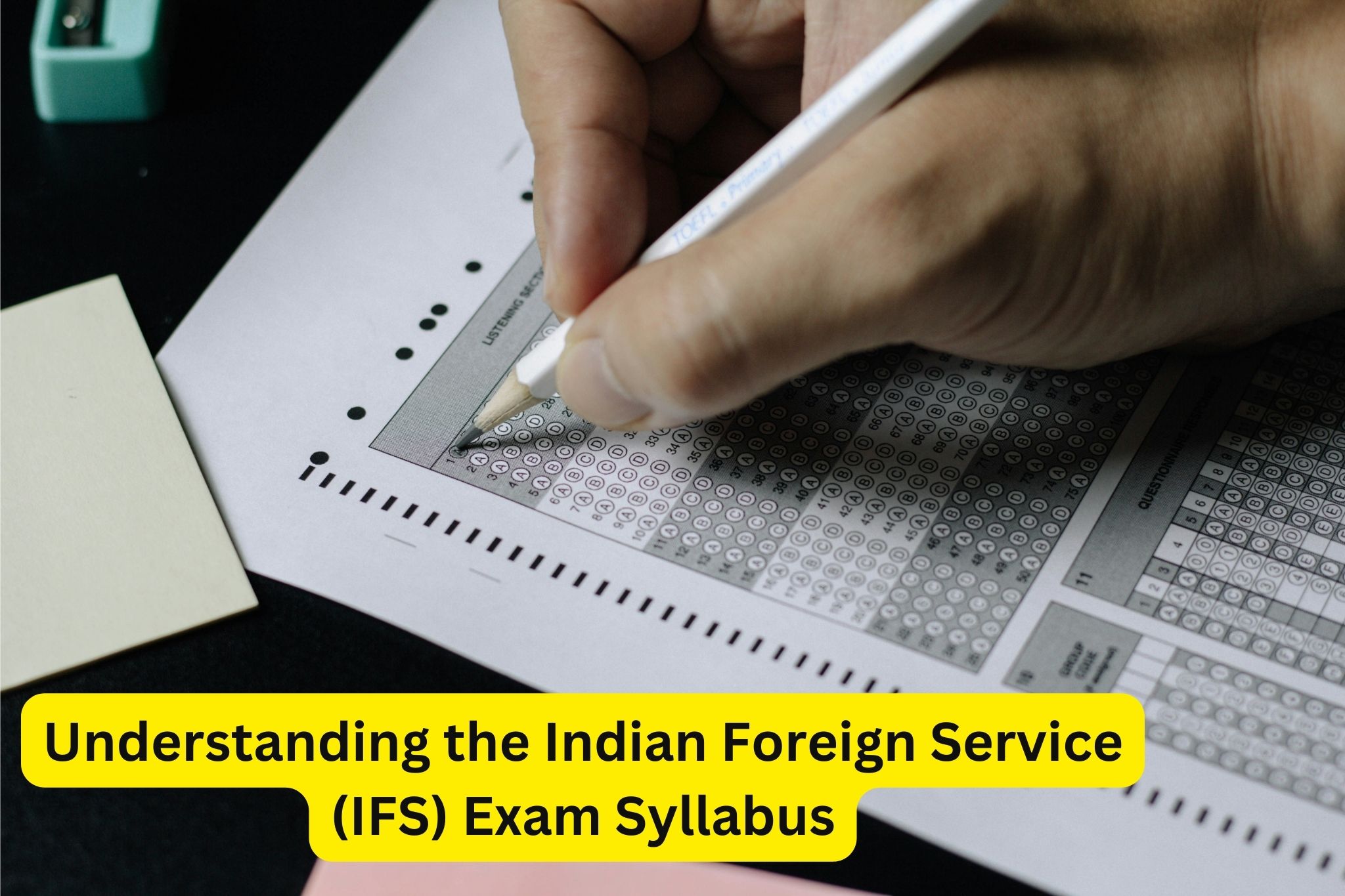Introduction
The Indian Foreign Service (IFS) is a prestigious career option for many candidates who appear for the UPSC civil service examination. The Indian Foreign Service Exam is a test for people who want to work in the Indian Foreign Service. It’s like a big job interview for individuals who want to represent India in other countries. This exam helps choose the best people to be diplomats and work for India’s interests abroad.
Once candidates clear this examination, they undergo training at LBSNAA to prepare for their roles in the IFS. The training at LBSNAA includes learning English, one foreign language, and Indian diplomacy. Let’s delve into the details of the UPSC examination pattern and the syllabus for the IFS exam.
UPSC Examination Pattern:
1. Official Notification: The UPSC releases its official notification in February each year for the Civil Service Examination.
2. Vacancies: There are at least 1000 vacancies for group A posts in the Indian government, including IAS, IPS, IFS, IRS, and IRTS.
3. Preliminary Examination: The UPSC conducts the preliminary examination in May. Candidates who qualify for the preliminary exams move on to the main examination in October.
4. Mains Examination: prelims-qualified candidates write the mains examination in October. After clearing the mains, candidates face the interview in January of the next year
5. Service Preference: Before the interview, candidates select their preferred services, such as IAS, IPS, IFS, IRS, and IRTS.
6. Scoring: Candidates need to obtain a good score (at least 50%) to secure their preferred choice of service.
7. Training at LBSNAA: Every selected candidate undergoes training at LBSNAA in Uttarakhand.
Civil Services Exam Syllabus Pattern:
1. To get ready for the civil service exam, you can easily find the syllabus on the Union Public Service Commission’s official website. This website gives all the information needed to study well. You can check it whenever you want. Also, there’s a helpful app called Jijaji that can send you notifications about important updates. With these resources, candidates can have a clear idea of what to study and stay informed about any changes or announcements regarding the exam.
2. In the UPSC exam, there are two stages:
1. Preliminary exam 2. Mains exam
Both the preliminary and Main stages cover subjects like General Studies, Current Affairs, History, Geography, Indian Polity, Indian Economy, and General Science. However, the Preliminary Exam includes an Aptitude Test, which is not present in the Main Exam. Additionally, the Main Exam includes an Optional Subject, which is not part of the Preliminary Exam.
| General Studies | ✔️ | ✔️ |
| Current Affairs | ✔️ | ✔️ |
| History | ✔️ | ✔️ |
| Geography | ✔️ | ✔️ |
| Indian Polity | ✔️ | ✔️ |
| Indian Economy | ✔️ | ✔️ |
| General Science | ✔️ | ✔️ |
| Aptitude Test | ✔️ | ❌ |
| Optional Subject | ❌ | ✔️ |
3. Overview of Preliminary Examination for UPSC:
1. Objective Type: The Preliminary Exam consists of objective-type questions (multiple-choice questions).
2. Screening Test: It serves as a screening test to shortlist candidates for the Main Exam.
3. Two Papers: There are two papers in the Preliminary Exam – General Studies Paper-I and General Studies Paper-II (CSAT).
4. General Studies Paper-I: This paper covers subjects like History, Geography, Indian Polity, Indian Economy, General Science, and Current Affairs.
5. General Studies Paper-II (CSAT): This paper assesses the candidate’s aptitude and comprehension skills.
6. Maximum Marks: General Studies Paper-I carries 200 marks, while General Studies Paper-II (CSAT) carries 200 marks as well.
7. Negative Marking: There is ⅓ negative marking for incorrect answers, so candidates must be cautious while attempting questions.
8. Basic Requirement to Qualify: Candidates need to score the minimum qualifying marks set by UPSC in General Studies Paper-I. The marks obtained in General Studies Paper-II (CSAT) are qualifying in nature.
9. Cut-off Marks: The cut-off marks for the Preliminary Exam are determined based on the score of paper-I and are different for different categories of candidates.
10. No Scaling: Unlike the Main Exam, there is no scaling of marks in the Preliminary Exam. The marks obtained by candidates are considered as it is.
11. Merit-Based Selection: Candidates who qualify for the Preliminary Exam are eligible to appear for the Main Exam based on their merit in the Preliminary Exam.
The syllabus for the Indian Foreign Service examination is comprehensive and covers various subjects to assess the candidate’s knowledge and aptitude for diplomatic roles. Here’s a breakdown of the syllabus:
4. Overview of Mains Examination for UPSC:
1. Descriptive Format: The Main Examination consists of descriptive type questions that assess candidates’ in-depth understanding and analytical abilities.
2. Comprehensive Assessment: It comprehensively evaluates candidates’ knowledge across various subjects and their ability to articulate their thoughts effectively.
3. Nine Papers: There are nine papers in the Main Examination, out of which two are qualifying in nature and seven are merit-based.
4. Qualifying Papers: The qualifying papers are Paper-A (Indian Language) and Paper-B (English). Candidates need to score the minimum qualifying marks in these papers as prescribed by UPSC.
5. Merit-Based Papers: The merit-based papers cover subjects like Essays, General Studies (I, II, III, and IV), and Optional Subjects chosen by the candidate.
6. Optional Subject: Candidates have the flexibility to choose one optional subject from a list provided by UPSC, based on their interest and expertise. In option subject, there will be two papers and the total maximum marks will be 500.
7. Maximum Marks: The maximum marks for the Main Examination vary for each paper. Generally, an Essay carries 250 marks, each General Studies paper carries 250 marks, and the Optional Subject paper carries 500 marks due to double paper.
8. Total Marks: The total marks for the Main Examination sum up to 1750.
9. Language Papers: The language papers (Paper-A and Paper-B) are designed to test the candidate’s proficiency in Indian languages and English, respectively.
10 Merit List: Candidates are ranked based on their performance in the merit-based papers (Essay, General Studies, and Optional Subject), and the final selection is made based on their aggregate marks in the Main Examination and the Interview.
Candidates who qualify for the Main Examination are called for the Interview stage, which is the final stage of the UPSC examination process.
5. Interview Stage
1. Personality Assessment: The interview aims to assess the candidate’s personality traits, including communication skills, confidence, integrity, and leadership qualities.
2. Analytical and Communication Skills: The interview panel evaluates the candidate’s ability to analyze situations, think critically, and provide logical solutions to problems. Both verbal and non-verbal, is crucial. Candidates are expected to articulate their thoughts clearly and concisely.
3. Decision-making Skills: The interview assesses the candidate’s decision-making abilities, including their thought process behind making ethical and practical decisions.
4. Emotional Intelligence: Candidates are evaluated on their emotional maturity, empathy, and ability to handle stressful situations with composure.
5. Overall Personality Evaluation: The interview panel looks beyond academic achievements to gauge the candidate’s overall personality, including their values, interests, and motivations. Candidates may face open-ended questions that require thoughtful responses, allowing the panel to assess their thought processes and depth of understanding.
Candidates should focus on comprehensive preparation, including regular practice, mock tests, and staying updated with current events, to increase their chances of success in the examination and pursue a career in the Indian Foreign Service.
Preparing for the IFS Exam
The exam needs a good plan and hard work. Here’s how you can get ready and improve your chances of doing well:
1. Stay updated on what’s happening in the world by reading news from trusted sources and international journals.
2. Practice with mock tests and old question papers to understand how the exam works and manage your time better. Look at your results to see what you’re good at and what you need to work on.
3. Manage your time well by setting aside specific times for each subject and topic. Focus more on areas you find difficult while also reviewing what you already know.
4. Talk with others in groups, have debates, and attend seminars to share ideas and learn more about international relations.
5. Review what you’ve learned regularly, make summaries, use flashcards, and go over difficult topics again. Understand the concepts instead of just memorizing them.
Conclusion
The Indian Foreign Service (IFS) exam is an important opportunity for those interested in diplomacy and global affairs. To succeed, candidates need to study hard and understand various subjects like Indian diplomacy, current events, and languages. With dedication and practice, candidates can increase their chances of joining the prestigious Indian Foreign Service. The Indian Foreign Service (IFS) Exam syllabus tells you everything you need to know for the test. It helps to see if you’re good at diplomacy and international relations. If you study it well and prepare smartly, you can have a great career in the Indian Foreign Service. This will help India in its diplomatic work around the world.
FAQs (frequently asked questions)
When Does UPSC Release Its Official Notification for the Civil Service Examination?
The UPSC releases its official notification in February every year, announcing the commencement of the Civil Service Examination and including details about the Indian Foreign Service (IFS) examination syllabus.
How Many Vacancies Are There for Group Posts in the Indian Government, Including IFS?
Annually, there are at least 1000 vacancies available for group A posts within the Indian government, which encompass positions in the Indian Foreign Service (IFS), among other services. Maybe 25-30 posts will be available for IFS.
What Subjects Are Covered in the General Studies Section of the IFS Exam Syllabus?
The General Studies section of the IFS examination syllabus comprises various subjects such as current events, Indian politics, governance, social and economic development, environmental ecology, general science, and basic numeracy, ensuring a holistic evaluation of candidates’ knowledge and aptitude.

